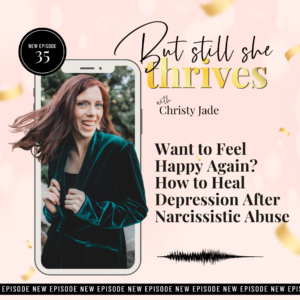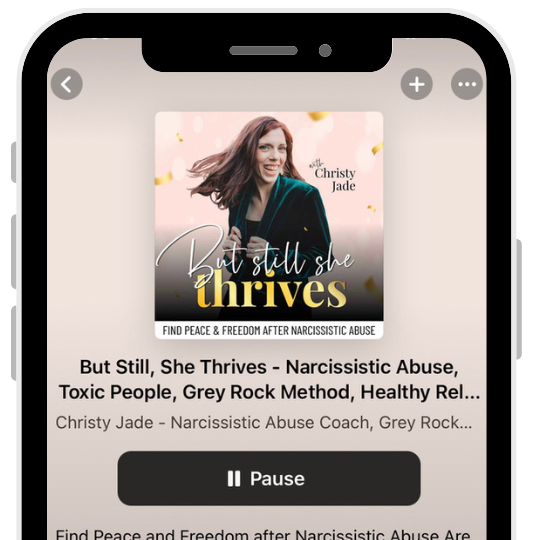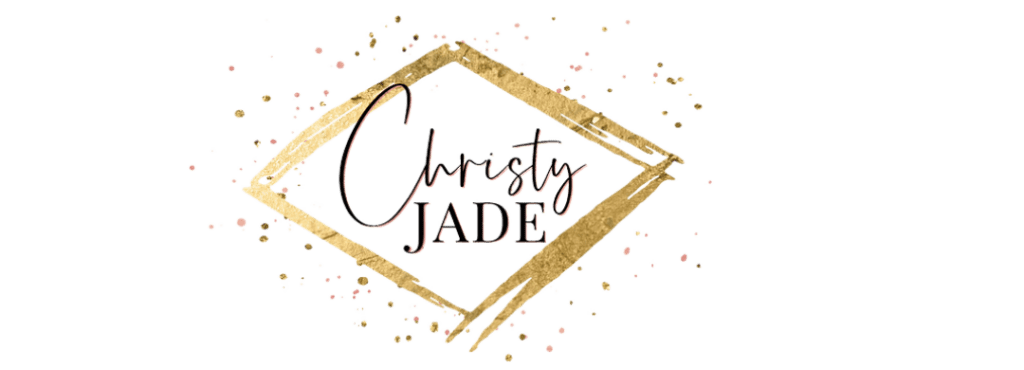Want to Feel Happy Again? How to Heal Depression After Narcissistic Abuse
Top 3% in podcasts globally
This week we talk about How to Help Heal Anxiety and Fear After Narcissistic Abuse
Let me help you with 1:1 coaching special pricing for the month of May with VIP PRICING!
One spot left!
https://shethrives.thrivecart.com/journey-to-peace-coaching-blueprint/
GET ON MY WAITLIST FOR MY UPCOMING COURSE:
https://queensofpeacewaitlist.lpages.co/early-bird-waitlist/
FREEBIE TIME!
My FREE 4 MINUTE empowering meditation:
https://christyjade.ck.page/insider
Join my free facebook group here:
https://facebook.com/groups/christyjade
Have trouble setting boundaries in your life?
Grab my E-Course here:
https://christyjade.podia.com/boundariescourse
And if you just wanna peek around and find out more about me and my work..check out my website! It’s FUN AND SPARKLY 😉
Want to drop me a line or have a question? Email me anytime!
Let’s connect on social media!
https://www.instagram.com/fiercechristyjade/
https://www.tiktok.com/@fiercemamachristy
After abuse we need SIMPLE. I created a planner for busy women just like you to navigate your days easier: https://christyjade.podia.com/shethrivesplanner
I am Christy Jade, adoring wife, adoptive mama and narcissistic abuse survivor. I now help other women who have gone through abuse (or are going through it) find confidence, power and peace.
DOMESTIC ABUSE HOTLINE : 800-799-7233
SUICIDE HOTLINE: just dial 988
Speaker 1: (00:00)
Welcome back to the Effects of Narcissistic Abuse series here on, but still she thrives. And today we are gonna focus on helping heal depression. Depression is a very real thing. I’ve gone through it myself. It can be a dark place. Some symptoms of depression are low energy, feeling very sad and hopeless. Thoughts of self-harm or suicide, irritability, changes in eating behavior, sleeping changes, loss of interest in hobbies and activities. Just not feeling up to doing the things we like to do and difficulty concentrating or even just making simple decisions. I do wanna start this episode out saying if you have depression and it is out of control, having any self harm or suicidal thoughts, you feel like you just can’t get out of it, I would like you to seek help. If you are having suicidal thoughts, please call the suicide hotline. I will put the phone number in my show notes.
Speaker 1: (00:56)
If you have depression and it’s not exactly to that level, but you really want help, I highly advise seeking therapy. And don’t forget that there is online therapy. If you don’t find someone that’s a good fit locally, there is always online options. So let’s dive into some of the ways you can help to accelerate your healing with depression after narcissistic abuse. As we know, recovering from narcissistic abuse is a very complex and challenging journey. I mean, that’s a given. That’s why I’m here. That’s why I have this podcast, right? But it can lead to really deep emotional wounds, including depression. So the effects of this type of abuse can have a huge impact on your mental health and your physical health, right? So it’s very important to remember that healing and reclaiming that inner happiness, which is possible, I promise. It is possible. It’s having that faith, right?
Speaker 1: (01:47)
So today we’re gonna explore strategies to help you support your recovery through this journey. Number one, first, as I mentioned, please seek professional help if you have depression. This can be a hard hole to climb out of, and it’s very difficult to do alone. It’s a serious mental health condition. And it often does require that professional support. So, like I said, reach out to a qualified therapist, find someone locally, find someone online. There are so many options with the internet now, so reach out and get help. It is not weak. And especially if this has been ongoing, it’s really important to have support. There can be a stigma against therapy, or maybe you had a bad experience with a therapist. I urge you to try again. It is kind of like dating. It’s not always gonna be the first therapist that you go into their office.
Speaker 1: (02:36)
It’s a perfect match, right? I have gone through a couple where I was just like, what in tarnation? Did I just say Tarnation? Does anyone say Tarnation? I don’t think that’s a thing we should say no. But, uh, one experience I had, I literally was like, how is this person a therapist? Right? So you may have to kind of date around, but it is worth the effort to find somebody who can fully support you and help you on this journey. Because like I said, you really do need support. Number two, practice self-compassion. This one is hard sometimes, especially if you’re like, you know, knee deep in depression. You don’t have tons of compassion. But really try to be gentle with yourself. You know, the self-compassion is essential to counteracting the negative beliefs that have entered your brain and caused this cycle, right? Um, you’ve been told a lot of things for a long time.
Speaker 1: (03:28)
Probably if you are under the thumb or were under the thumb of a narcissist. So undoing that damage is not going to be overnight, but it is possible. And during the journey, you need to treat yourself with kindness, understanding, and forgiveness. Often we will blame ourselves first because narcissists blame us. So we take on that role. Second, even if we get out of it and we look back going, what did I do here? What did I do to my children? And it’s like we put this guilt trip on ourselves. We do not need that extra guilt queen. Okay? You don’t need that. Forgive yourself. It’s okay. You did your best, right? You did the best with what you had. We all don’t know the answers. We, we aren’t born with a handbook. So I want you to give yourself grace, and I want you stop feeling guilty.
Speaker 1: (04:10)
Forgive yourself so you can make the room for that self-compassion. Now, what does that look like? Positive self-talk, right? I do this with my clients. It may sound simple, but I am telling you it works when you repeat affirmations over and over when you do the tapping, when you do any of these mindfulness activities to help retrain your brain to think positive thoughts that replace those negative thoughts, it will benefit you. Even if even in a few minutes, it’ll benefit you. And over time, if you’re repeating that every day, every night, whatever it is, it’s going to have really long-term lasting effects and completely change your mindset and your confidence. So do all the self-talk and all the self-care too. What does that look like? I am big on yoga, especially yin yoga for trauma, re related things, getting outside in nature, exercising, just moving it all dancing.
Speaker 1: (05:07)
Nine is hip hop high up on my list. , anything you can do to get out of that head and in your body. I will tell you this, when I was going through some narcissistic abuse years ago, I was so d like I’m talking about my depressed time. I, I had a really depressed era. I will call it unrecognizable to myself or to other people. I am normally a, you know, bright, bubbly, yay, I’m the clown of the show. Do, do, do do. I was not. I was depressed. I was cut off from the world. I was laying in bed. I had gone through something else in my life and just all of it on top was just too much and I just felt like a big gray cloud. One of the things that helped me, actually, it’s one of the main things, I will be honest, because I said I have to pull myself out of this. I really honestly didn’t wanna go on medication. And that may have been stupid.
Speaker 2: (05:56)
I don’t know. That was me. It was years ago. I just didn’t want to. So I was like, well, if I’m not gonna go on medication, then I need to drag myself out of this. So I started just exploring what I could to get myself out of my head, right? I mean, listening to sad songs was not helping. So what did I do? I actually took my radio out of my room cuz I would sit there and just sit, listen to sad songs. Like that’s what that is. Not helpful. Little tip on the side there. But what I did do was, first of all, I signed up for a class to just get me out of bed. It was a daily class at the community college just to get me outta bed. This is before I had a family or anything. Cause I was in my, I guess 19, 18, 19 years old.
Speaker 2: (06:39)
And also I’m committed to myself. You are going to get your butt out of bed every morning and run. I was not a runner, I just wasn’t. I didn’t even like running, but I knew I had to move my body and I had to get out of my head. It is huge in healing. So getting out in nature, moving your body, signing up for something fun you can look forward to, these are all some really great ways to care for yourself. Self-care. Yay. Number three is an important one. Building a supportive network. Especially when you have gone through abuse and you have been isolated from people you loved. This can happen very frequently, especially when you’re in romantic situations with with a narcissist. Uh, that is one of their tactics to control you. They will isolate you, keep you from your peeps, and it’s time to reconnect to the people you love.
Speaker 2: (07:30)
If they treat you well. If not building a new community, building a new supportive network. This can look like just joining a local. Let’s say you’re a mom. I know I have a lot of moms here joining a local mom’s group. Going out, making the effort. Even if you don’t feel like it, get those shoes on. Put some red lipstick on and go out and meet people and meet uplifting people. Joining meetup.com is actually a great place. I’ve gone, I actually made some great friends on meetup.com. I love Meetup because they have specific groups for specific interests. So let’s say you’re an avid book reader, they have book groups, book clubs, whatever. What else? Uh, if you’re into yoga, they may have yoga or meditation, mindfulness type things. If you love cooking, they have cooking groups. If you love to travel, they have travel groups.
Speaker 2: (08:19)
So you can categorize it, you can filter it by location and interest and, you’ve got a built-in support. It’s amazing. So my personal opinion when you’re healing from abuse and isolation is to do those in-person things. Yes, there’s online groups. I advise you can join those as well. But I will be honest, to really heal and get out of your head and out of your house, , cuz you wanna get out in the world and be living. I highly recommend in-person groups. And again, that could look, that could even be at the gym striking up conversation. You might have to put your neck out, which is a little hard after you’ve been a victim of narcissistic abuse. But that’s what I’m here for. This is what I help my clients with, right? Like this is the stuff we work on. So if you’re interested in working with me, I actually have extended my special pricing for my journey to piece call and blueprint.
Speaker 2: (09:11)
So it’s normally 200, it is 97, I’m extending that this week. So because you’re a podcast listener, you are getting special pricing. So you can look at that link. I will put it in my show notes in the podcast description. But basically this is stuff we work on When you work one-on-one with me doing all of this stuff, figuring it out, any questions you have, any guidance you need, any support. That is what I’m here for. Number four, so important is setting boundaries. We’ve talked about this a lot. It’s one of my favorite things to talk about. I’m a boundary queen. But establishing and enforcing these healthy boundaries, right? Not just saying this is my boundary, but actually living up to it and making sure it happens and you stick to it is crucial in protecting your mental health during this time. Narcissistic abusers often disregard boundaries, which can perpetuate the feelings of helplessness that you have.
Speaker 2: (10:05)
And they can exacerbate your depression, which we don’t want that queen. We don’t have time for depression, right? We have a big badass life to live. Again, this is something I help with my clients because a lot of narcissistic abuse victims are kind of people pleasers or maybe have fears around the narcissist. So we work on ways how to really stay strong in your boundaries. So practice saying no when necessary and surround yourself with people who respect and support your boundaries, right? That’s helpful. Number five, engage in self-reflection and healing activities. So we gotta do a little reflection on this journey just a little bit, right? So reflect on your experiences. Explore how has this impacted me? What is this abusive relationship done? Sometimes it’s not fun to look at this, but it’s very important. In order to heal, you’ve gotta shine a light on what it is, okay?
Speaker 2: (10:56)
So engaging in those activities helps your personal growth. You can do, and we’ve talked about this on many episodes, but we’ll repeat it, journaling, art therapy. Again, all those good mindful activities like affirmations, yoga, meditation, and these activities will help you process your emotions while you’re doing them. Even doing yin yoga where you are just sitting in poses for three to five minutes, that is helping you process the things that you have gone through. It is amazing to me. Ah, I just love this work. Number six, celebrating those small victories. I think we talked about this a little bit with anxiety too, but with depression, even the simplest task can feel so challenging. And I’ve noticed that even with myself back in the day. And then with current clients I have where you may be out of your situation, but you have a lack of energy, a lack of motivation that comes with the healing process, right? So even those simple
Speaker 3: (11:52)
Tasks can feel like, oh, so heavy. So celebrate each small victory along this journey. I want you to just clap for yourself. You can get an accountability partner where you can ask one of your friends every day in the morning or in the evening, just text each other three things you’re grateful for and one win you had that week. And as you grow, you will see, you’ll wanna do even more. You’ll think of even more things. It’s kind of just practicing this new muscle in your brain that’s like, Hey, look, I’m winning at life. We love winning and sharing. Winning is great and your friend will love it too. So find a friend that is uplifting and loving and say, let’s do this every day. I mean, who does not wanna start the day or end their day with happiness and victories and gratitude? I mean, that being said, if we have some setbacks, that’s okay.
Speaker 3: (12:45)
Be gentle with yourself. Remember, it takes time. This healing process takes time. Every effort counts. So it’s not perfection, it’s progress and it’s the effort you put in and that you’re trying. That’s so important. Do you know what a big deal it is that you’re even doing this? This is amazing that you are here on my podcast. You are doing the work, you are self-aware and you are going to heal, and we’re gonna make it fun. So remember that recovering from depression after narcissistic abuse especially, it is a gradual and individualized process. So seek the help, find a support group, be compassionate with yourself. Set those boundaries. You’ve gotta do a little self-reflection. I’m sorry, it’s part of the process. Prioritize that self-care and celebrate the victories and have gratitude every day and be kind to yourself during it, during this whole process. Okay, what? What do we wanna end with? Let’s think of some good old Christy, Jade affirmations. All right, hands on your heart, but if you’re driving, keep your hands on your wheel. All right, take a nice breath. Hands on heart. I am healing. I am so proud of how far I’ve come. I am strong. I am a queen. It’s true. I’ll end with that. Like I said, it is the last week, but I did wanna extend my special pricing to you guys before my daughter is out of school, and I will less time to do one-on-one session. So grab it if you want it. It’s in the show notes, podcast description, whatever you wanna call it. And I hope you all have a beautiful couple of days until we meet again in our next episode. Smooches and Ds.



